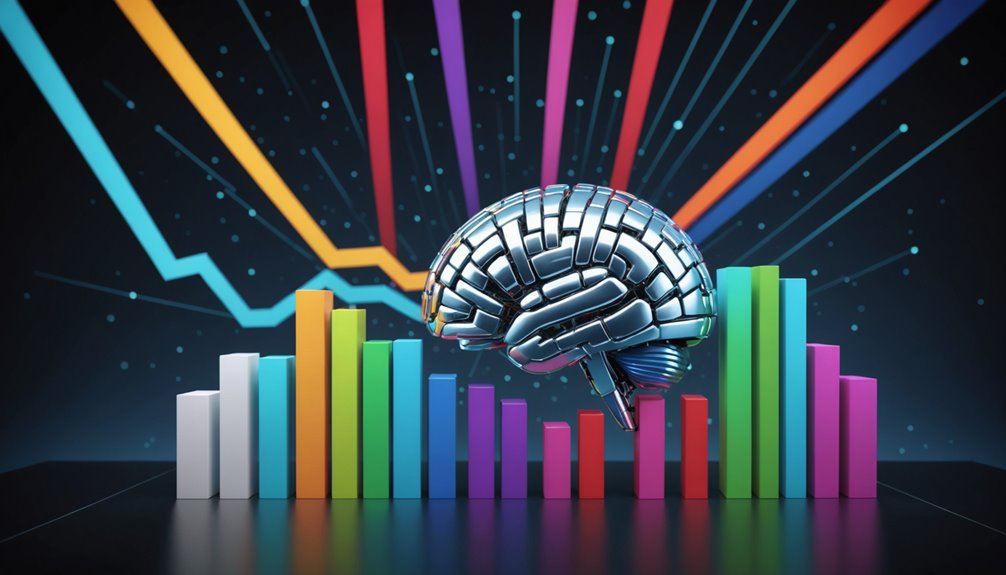The incorporation of Artificial Intelligence (AI) into lead generation is paving the way for explosive sales growth. Simple tools like AI chatbots and AI voice technology are making it easier than ever for businesses to engage with customers, automate processes, and increase sales. These technologies help companies respond faster to customer needs, improve follow-up, and boost engagement—all of which contribute to explosive sales growth.
As we move toward 2025, businesses that understand and begin using AI tools will have a significant advantage over those that don’t. AI-powered systems like chatbots and AI-enhanced lead generation are helping companies stay ahead of the competition. These tools make it easier to connect with potential clients, answer their questions, and guide them through the sales process quickly and effectively, leading to increased sales and stronger customer relationships.
The benefits of AI are clear: by adopting AI-driven solutions, businesses can achieve explosive sales growth and streamline their operations. Whether you’re using AI chatbots for quick customer support or AI voice tools to handle inquiries, the impact on your sales is undeniable. Don’t wait—embrace these powerful technologies now to set your business up for success in the years to come.
Harnessing AI for Explosive Sales Growth at LaunchedKey Takeaways
- AI enhances lead generation through automation, predictive analytics, and 24/7 customer engagement via chatbots, boosting operational efficiency by 10-15%.
- AI-powered tools like HubSpot and Improvado integrate data for insightful campaign performance analysis, facilitating data-driven decision-making.
- AI streamlines sales processes, predicts customer behavior, and automates repetitive tasks. 81% of sales teams use AI to grow revenue.
- Future AI trends include hyper-customization, predictive lead scoring, voice and visual search integration, as well as AI-driven content creation for improved customer engagement.
- AI chatbots improve data collection, refine targeting strategies, prioritize leads based on conversion potential, and optimize conversion rates.
Overview of AI in Lead Generation
Releasing the power of Artificial Intelligence (AI) is revolutionizing the field of lead generation. AI integration in this arena is characterized by an array of features and capabilities that not only automate repetitive tasks but also improve research and strategy with advanced machine learning algorithms. These features expedite the lead qualification process using predictive analytics and lead scoring while providing consistent 24/7 support through chatbots and virtual assistants.
The integration of AI in lead generation techniques offers a myriad of benefits, including efficient lead conversions, improved lead quality, and an upgraded rate of engagement. It facilitates a strategic advantage by leveraging AI’s ability to process large volumes of data quickly and accurately. This scalability and adaptability prove to be essential for evolving business needs.
AI-powered lead generation techniques, such as predictive lead scoring and propensity modeling, are game-changers. They enable personalization of marketing efforts based on customer behaviors and preferences. This innovation is propelling businesses toward explosive sales growth by effectively using data to make informed decisions and optimize lead-generation strategies. Furthermore, the utilization of AI content generators in lead generation strategies streamlines content creation processes and improves conversion rates, leading to more effective and efficient campaigns.
AI’s Impact on Lead Generation
Undeniably, the advent of AI has markedly transformed the landscape of lead generation, carving out a new pathway for efficiency and productivity. AI’s sophisticated algorithms improve lead scoring, allowing sales teams to better prioritize prospects based on a myriad of factors, such as engagement level and demographic information. This is not merely a theoretical advantage; actual case studies underscore the effectiveness of this AI-driven approach, with numerous companies reporting significant increases in lead generation and conversions.
AI’s automation capabilities also substantially increase productivity. Research suggests that AI can drastically reduce the time spent on tasks such as lead research and follow-up, freeing sales reps to dedicate more time to tasks requiring individual insight and judgment. Additionally, the implementation of AI in sales automation can lead to a 10-15% increase in operational efficiency(Operational Efficiency).
Moreover, AI enables a new level of customized marketing. By identifying patterns and behaviors indicative of a lead’s readiness to purchase, AI systems can dynamically segment leads and tailor communications for maximum impact. Further, AI’s role in enhancing collaboration and focus between sales and marketing teams has led to improved operational efficiency and customer engagement (Operational Efficiency).
Techniques for AI-Powered Lead Generation

As businesses investigate AI-powered lead generation, a myriad of techniques and strategies emerge, offering state-of-the-art ways to identify, engage, and refine leads. Tools such as web scraping, predictive lead scoring, and AI-integrated CRM data capture are revolutionizing lead identification.
AI chatbots are at the forefront of this evolution, acting as virtual sales reps that engage, qualify, and nurture leads around the clock. AI’s ability to recommend next-deal actions, guide customers through the sales funnel, and improve engagement through predictive analytics has shifted the paradigm of traditional lead engagement. Furthermore, the utilization of AI and automation tools in sales has proven to enhance lead conversion rates, leading to an overall increase in sales efficiency.
The market also offers a robust array of AI tools, such as Customers.ai, Albert, Drift, Intercom, Relevance AI, and Copilot AI, which provide an extensive suite of capabilities from message automation and data integration to predictive analytics. These AI tools are especially valuable in assisting marketing professionals who often face challenges such as data integration issues and the need for better reporting tools due to competitive pressure and leadership focus on ROI. This is where AI tools like Improvado come into play, offering a solution for data aggregation and deeper insights into campaign performance. This data aggregation and analytics capability of AI tools is transforming the lead generation process.
AI-driven analytics are also being utilized to identify high-impact lead-generation patterns, monitor performance trends, and proactively identify new potential customers. This integration of AI in lead generation, consequently, leads to a more efficient and optimized process, redefining the landscape of sales growth.
Exploring AI’s Role in Sales Growth
AI’s role in sales growth is increasingly significant, with advanced technologies transforming traditional sales strategies into more efficient and productive practices. By integrating AI-driven lead generation in sales, businesses can streamline their processes, predict customer behavior, and ultimately improve revenue growth. In fact, a whopping 81% of sales teams are either experimenting with or have fully implemented AI in their operations, showcasing the widespread acceptance and adoption of these technologies in the sales landscape (AI adoption in sales). The use of AI also offers opportunities to automate repetitive tasks, saving time and increasing productivity (time-saving automation solutions). In this section, we will investigate how releasing the potential of AI in sales can lead to groundbreaking growth and success.
Unleashing AI in Sales
Utilizing the power of artificial intelligence can considerably elevate sales growth and improve general business performance. AI plays a pivotal role in augmenting sales strategies, driving performance metrics, transforming sales processes, and redefining sales training and development.
- Augmenting Sales Strategies: AI processes vast amounts of data to generate actionable intelligence. With AI’s predictive analytics, businesses can make strategic decisions, identify market trends, and improve resource allocation.
- Driving Performance Metrics: AI’s ability to explore conversion rates, deal sizes, and customer acquisition costs allows businesses to identify areas of improvement, uncover patterns, and optimize sales tactics for better profitability.
- Transforming Sales Processes: From predictive lead scoring to sales process automation, AI streamlines workflows, enabling immediate analytics and dynamic pricing. This not only improves efficiency but also increases customization, leading to higher customer engagement.
- Redefining Sales Training and Development: AI offers tailored learning paths, immediate feedback, and strategic planning tools. This boosts collaboration, provides deep customer insights, and pushes continuous improvement, liberating sales teams to achieve extraordinary results.
Moreover, by integrating AI into CRM systems, businesses can further optimize their lead follow-up strategies, thereby improving client retention rates by up to 80%.
AI-Driven Lead Generation
AI-driven lead generation is a powerhouse in sales growth, wielding the prowess of machine learning, predictive analytics, and data analysis. It transforms the traditional process by automating repetitive tasks and providing authentic-time insights from vast data troves, thereby improving efficiency and accuracy. Through machine learning, AI systems continuously refine lead scoring and nurturing, delivering a more individualized and engaging customer experience.
Simultaneously, AI integration brings cost-effectiveness to lead generation by focusing on high-potential leads and optimizing resource allocation. It utilizes advanced algorithms and neural networks, interpreting data in natural language format, which boosts chatbots and virtual assistants’ performance.
In terms of market research, AI is a game-changer. It identifies trends and patterns from diverse sources to effectively identify leads. The resulting automated workflows streamline vital operations like data analysis, lead grading, and nurturing.
Empowered by AI, businesses can experience explosive sales growth through predictive analytics, data segmentation, and AI-driven analytics. By automating lead scoring, AI not only focuses on high-potential leads but also optimizes sales efforts, thereby driving sales pipeline efficiency. This fusion of AI and lead generation is paving the way for a groundbreaking sales future.
Moreover, CRM systems like Salesforce(#) can use AI to enhance the seamless management of leads further, improving the efficiency of the sales process and driving revenue growth.
Best Practices for AI Integration

In the dynamic landscape of lead generation, integrating artificial intelligence (AI) effectively is crucial. Best practices for AI integration are constantly evolving, requiring a strategic, forward-thinking approach.
- Select Appropriate AI Tools: This includes tools like HubSpot for automation, Leadfeeder for segmentation, and advanced analytics for nuanced lead scoring. Automation and customization are key, as they increase efficiency and the likelihood of capturing high-quality leads. Tools like automated call handling systems can also be helpful in managing missed calls, reducing the potential loss of revenue and client engagement.
- Effective AI Implementation: Clearly define your lead generation goals and identify where AI can be impactful. Research and select AI tools that align with your goals and existing systems. Confirm your data is clean and structured, then integrate AI tools into your workflows. Invest in training your team to use and interpret the AI system outputs.
- Continuous Monitoring and Optimization: Regularly monitor and optimize AI algorithms based on performance metrics. Use A/B testing for effectiveness, balance automation with personal oversight, and update AI models regularly to reflect changes in consumer behavior.
- Strategic Lead Segmentation: Divide leads into similar segments for targeted messaging. Use AI for refined segmentation and predictive analytics for customer behavior forecasting. Continuously analyze actual-time data to refine segmentation and improve lead generation. Furthermore, utilizing AI tools like Clearbit can provide real-time data enrichment, assisting in lead identification and segmentation.
Adopting these practices will optimize your AI integration, driving explosive sales growth.
Future Trends in AI Lead Generation
Emerging AI technologies are dramatically reshaping the landscape of lead generation. A significant shift is the rise of hyper-customization, where AI scrutinizes every facet of customer behavior to create distinct customer journeys, resulting in increased engagement and conversion rates. AI tools are now capable of immediate adjustments, offering businesses the flexibility they crave.
A subsequent trend, predictive and advanced lead scoring, utilizes AI to determine which leads have the highest conversion potential. This optimization of sales workflows and focus on high-potential leads improves ROI, demonstrating the value of AI integration in lead generation. An additional advantage of this AI-powered scoring is the potential to reduce the sales team’s workload, allowing them to focus more on nurturing relationships with potential customers (sales team dynamics).
Further, the use of emerging technologies such as voice and visual search in lead generation strategies is gaining traction. The integration of natural language processing (NLP) into AI tools enhances customer experiences by providing more intuitive search methods.
Finally, AI-driven content creation is emerging as a powerful tool in lead generation. AI’s ability to generate tailored content at scale, coupled with immediate adaptation to lead responses, refines marketing efficiency and improves content quality. These trends highlight the revolutionary role of AI in shaping the future of lead generation.
Understanding AI-Driven Segmentation

As we investigate artificial intelligence and its role in lead generation further, our attention shifts to AI-driven segmentation. This groundbreaking approach uses advanced algorithms to analyze thousands of data points, identifying meaningful segmentation criteria and patterns within target audiences.
AI-driven segmentation is transformative in four key ways:
- It is dynamic and proactive, adjusting as new data becomes available and predicting future customer behaviors for proactive sales initiatives.
- It utilizes various data sources, including CRM systems and web analytics, for immediate, accurate segmentation.
- It improves market segmentation by uncovering hidden patterns in consumer behavior, thereby enabling businesses to tailor their sales approaches effectively.
- It optimizes resource allocation and increases the relevance of marketing initiatives by creating micro-segments tailored to unique audience groups.
In a world where businesses seek freedom from traditional constraints, AI-driven segmentation offers a powerful tool for effective lead generation. By integrating AI tools with existing CRM systems, companies can refine their lead nurturing strategies, guarantee buyer profiles remain up-to-date, and forecast future customer needs for dynamic content customization. This heralds a new era of growth and efficiency in sales and marketing.
The Power of AI-Powered Chatbots
The advent of AI-powered chatbots has transformed lead generation by enhancing user engagement and facilitating efficient data collection. These intelligent systems not only provide quick, individualized responses to potential leads but also gather essential information that can be utilized for future interactions. Consequently, they foster a more streamlined lead generation process, offering valuable insights for continuous optimization and customization.
Chatbots Enhancing Engagement
In the digital domain, AI-powered chatbots are revolutionizing the lead generation process, delivering 24/7 engagement and a degree of personalization previously unheard of in traditional marketing strategies. This evolution is mainly due to the groundbreaking fusion of AI technology with conventional customer engagement principles.
- Customization: AI chatbots can deliver tailored recommendations based on a prospect’s needs. This level of personalization improves user experience, leading to higher conversion rates.
- Efficiency: Chatbots streamline the sales process by automating routine tasks, such as scheduling appointments and qualifying leads. This efficiency allows sales teams to focus on closing deals rather than manual lead management.
- Analytics: Chatbots provide invaluable data that can be used to refine targeting strategies and content. Continuous optimization and A/B testing improve chatbot performance and engagement.
- Future Trends: The future of chatbots holds even more promise. With advancements in AI technology, chatbots will incorporate natural conversations and affective intelligence, enhancing engagement even further.
Data Collection Through Chatbots
Building on chatbots’ multifaceted benefits in improving engagement, it becomes clear that their true power lies in data collection. These AI-powered tools provide immediate data, operating 24/7 with improved accuracy, thereby broadening the scope of potential user insights. Through intuitive conversations, chatbots not only increase user engagement but also improve the efficiency and accuracy of data collection.
The power of chatbots extends to individualized and efficient data management. They can tailor conversations, building trust that encourages users to share valuable insights. Furthermore, they can automatically manage data, streamlining surveys while seamlessly integrating with CRM platforms. This results in a cache of data-driven insights that can sharpen marketing strategies and product offerings.
AI chatbots have transformed lead qualification, identifying potential prospects in real-time and reducing data errors. By offering customized interactions, they improve user experience and increase conversion rates. Looking ahead, chatbots promise deeper customization, seamless handoffs, and robust analytics tools, underlining their critical role in lead generation and data collection.
Embracing Predictive Lead Scoring

Adopting Predictive Lead Scoring presents an opportunity to transform lead management strategies. By utilizing AI-powered predictive modeling, businesses can precisely prioritize leads, foster sales efficiency, and reduce manual work. Additionally, the scalability of AI algorithms guarantees a dynamic approach that evolves with the constantly shifting sales landscape.
- Efficiency and Prioritization: By scoring leads based on their conversion potential, companies can channel resources towards high-probability prospects, conserving time and effort.
- Adaptability and Learning: As these models are exposed to new data, they learn and adjust, improving their predictive prowess over time.
- Data-Driven Objectivity: AI guarantees that lead-scoring decisions are based on complex data, thereby eliminating subjective bias and increasing the chances of successful engagement.
- Increased Conversions: Focusing on high-probability leads optimizes conversion rates, driving revenue growth.
Predictive lead scoring is not just a technological improvement; it’s a strategic enabler. It allows companies to utilize data-driven insights, maintain up-to-date information, and tailor their approach based on distinct industry trends. As businesses seek to access new levels of growth, the ability to adopt and integrate predictive lead scoring could be a game-changer.
Frequently Asked Questions
Can you provide case studies on where AI has significantly improved sales growth?
Indeed, with AI assistance, ACI Corporation saw a 6.5% sales conversion rate, up from under 5%. Likewise, Crabtree & Evelyn enjoyed a 30% increase in ad spend return through AI-powered marketing strategies.
What Are the Potential Risks or Challenges When Integrating AI Into Lead Generation?
Potential risks of integrating AI into lead generation include data quality issues, bias and ethical concerns, operational challenges during integration, and adherence to regulatory and privacy norms. Regular audits and updates can mitigate these risks.
How Does Generative AI Differ From Traditional AI in the Context of Lead Generation?
Generative AI differs from traditional AI in lead generation through advanced data analysis, individualized content creation, smooth incorporation, automation, and scalability. It offers strategic advantages like improved targeting and immediate analytics for high-quality lead generation.
Conclusion
The integration of artificial intelligence in lead generation has demonstrated remarkable potential for explosive sales growth. Future trends suggest an increased reliance on AI-powered tools, like chatbots and predictive lead scoring. AI’s ability to reshape and optimize the process of lead generation and sales growth provides a compelling case for its integration into business strategies. The trajectory of AI in lead generation clearly indicates a revolutionary impact on the business landscape.

Erik Remmel is a co-founder of Launched, a platform that helps businesses grow through AI-powered marketing, automation, and lead generation. He focuses on building scalable systems that convert cold leads into customers while streamlining operations with smart, AI-driven workflows.

